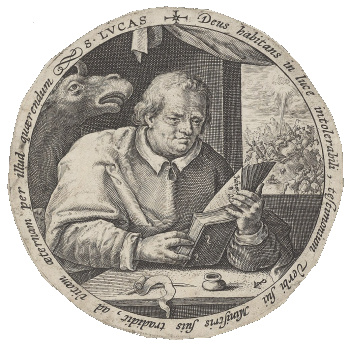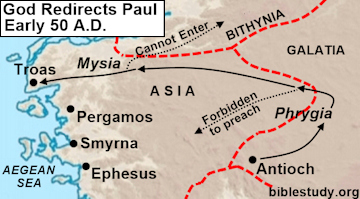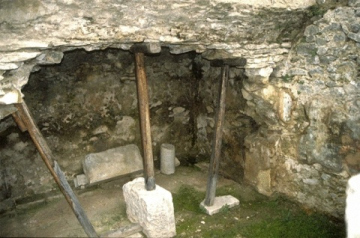[Timeline of the New Testament]
Luke (Colossians 4:14, 2Timothy 4:11) is also called Lucas in the King James Bible (2Corinthians 13:14 subscription, Philemon 1:24). His name means "light giving" (Strong's #G3065, Thayer's Greek Definitions).
c. 15 to 16 A.D.?
Birth
The Bible does not state when Luke began his life. That said, Wikipedia's article on the evangelist speculates his birth was between 1 to 16 A.D. He was highly likely born late in this period (15 / 16 A.D.) as Paul tended to attract and use younger men (e.g. Timothy) to aid his zealous ministry.
Early Catholic writers (1913 Catholic Encyclopedia article on Luke), as well as several Biblical commentaries, state that Luke was a native of Syrian Antioch. What is certain is that he was born a Gentile (non-Jew) and, as such, is the only New Testament writer who was not a Jew.
Where Did He Train?
Luke was a greatly beloved physician (Colossians 4:14). The 1913 Catholic Encyclopedia suggests that he possibly learned about medicine from a famous school in Tarsus which rivaled those in Alexandria and Athens.
40 - 49 A.D.
Luke's Conversion
Luke, living in Syrian Antioch, was likely converted by the Apostle Paul (Holy Bible, a Faithful Version, chapter 2). If this is the case, then he would have become a Christian during one of Paul's first two stays in the city.

Paul first arrives in Antioch, with Barnabas, in the summer of 40 A.D. He stays at least a year serving the city's new group of believers as well as preaching the gospel (Acts 11:26).
[Paul's First Missionary Journey Map]
Paul's second stay in Antioch took place after he and Barnabas conducted the first missionary journey. This stay, much longer than the first one, ran slightly less than three years (autumn of 46 A.D. to late summer of 49, Acts 14:26 - 28).
March - April 50 A.D.
Meeting Up with Paul
Paul's second missionary journey begins in late autumn of 49 A.D. with Silas as a companion. They first travel north and then west through Asia Minor. When they evangelize Lystra they gain a young man (possibly a teenager) named Timothy as a traveling companion (Acts 16:1 - 3).
The group then continue westward and, after being blocked by God from preaching in Asia or entering Bithynia, they end up in Troas (Acts 16:6 - 8). They enter the city around March or April of 50 A.D. It is in the city that Luke joins the group.

Luke denotes the time he joined the group by using the words "we" and "us" in Acts 16.
And a vision appeared to Paul during the night. A certain man of Macedonia was standing, beseeching him and saying, "Come over to Macedonia and help us."
And after he had seen the vision, WE immediately sought to go into Macedonia, concluding that the Lord had called US to preach the gospel to them (Acts 16:9 - 10).
[Why Are There Only Four Gospels?]
It is important to note that Luke, in Acts 16:10, includes himself, as well as Silas and Timothy, in the commission to preach the gospel to those in Macedonia. He can therefore justifiably, from this point forward in history, be considered an evangelist.
May 50 A.D.
Arriving, Staying in Philippi
Paul, Luke, Silas and Timothy arrive in Philippi and stay an unknown number of days before the arrival of Pentecost on May 17.
And from there we went to Philippi, which is the primary city in that part of Macedonia, and a colony. And we stayed in this city for a number of days. Then on the day of the weeks (Pentecost) we went outside the city by a river, where it was customary for prayer to be made . . . (Acts 16:12 - 13).
It is on Pentecost that a business woman named Lydia, and her entire household, are baptized and become the first known Christians on the European continent!
[Top Seven Places Paul Visited!]
Paul and Silas, sometime after Pentecost, are arrested, beaten and thrown into a Philippian jail for preaching the gospel. Luke and Timothy, however, are left alone (Acts 16:16 - 24). It is possible they escaped the wrath of those in Philippi because they did not look like Jews. Luke was a Gentile (non-Jewish) convert to Christianity while Timothy, although he had a Jewish mother, had a Gentile father (Acts 16:1, 2Timothy 1:5).

When Paul and Silas leave the city (Acts 16:40) both Timothy and Luke stay behind to strengthen the newly formed church. Timothy, a short time later, leaves Philippi and travels west to meet up with Paul. Luke, however, stays in the city.
August - September 57 A.D.
Meeting Paul Again
Paul stays in Ephesus, during his third missionary journey, until after Pentecost (May 29) in 57 A.D. He then travels to Troas and continues west to Macedonia (Acts 20:1). While visiting Philippi he runs into Luke who has been in the city since the last time he saw him during the second missionary journey.
[Ephesus and the Seven
Churches of Revelation!]
Paul, during his short stay in Philippi, has Luke and Titus transcribe his words into what will become the book of 2Corinthians.
The second epistle to the Corinthians, written from Philippi of Macedonia by Titus and Luke (2Corinthians 13:14 subscription, see also 2Corinthians 7:6).
Luke continues to stay in the city when Paul leaves to make a short visit to Corinth (Acts 20:2 - 3).
Spring 58 A.D.
Rejoining the Missionary Journey
Paul, after visiting Corinth, travels north back the way he came and returns to Macedonia. While visiting Philippi he reconnects with Luke who stayed in the city.
Paul and Luke decide to stay in Philippi and keep both the Passover and the Feast of Unleavened Bread with the local church. The rest of the evangelistic team (Timothy, Gaius, etc., Acts 20:4) with them are sent ahead to Troas.
These (the men who traveled with Paul, verse 4) went on ahead and waited for us in Troas. But we sailed away from Philippi after the Days of Unleavened Bread; and in five days we came to them at Troas, where we stayed for seven days (Acts 20:5 - 6).
[Paul's Second Missionary Journey Map]
The two men meet up with the rest of the team and together they stay in Troas seven days. Luke ends up traveling with Paul for the rest of his third missionary journey with the goal of reaching Jerusalem to celebrate Pentecost on May 21 (Acts 20:16).
Late Spring 58 A.D.
A Prophetic Warning
Paul, Luke and those with them, nearing the end of the third missionary journey, travel to Caesarea. The prophet Agabus, while the group stays with Philip the evangelist, arrives and foretells that Paul will be arrested and bound if he goes to Jerusalem.
And he (Agabus) came to us and, taking Paul's belt, bound himself hand and foot, and said, "Thus says the Holy Spirit: 'The Jews in Jerusalem shall bind the man whose belt this is in the same manner, and shall deliver him into the hands of the Gentiles.'" (Acts 21:11, HBFV).
Luke is one of the many Christians who urges Paul not to go to Jerusalem (Acts 21:12). The apostle, however, is undeterred and willing to die for the Lord if need be (verse 13).
Early Summer 58 to
Early Autumn 60 A.D.
Research and Writing
Paul, after his third missionary journey, is arrested in Jerusalem after almost being beaten to death by the Jews (Acts 21:26 - 33). He is ultimately sent back to Caesarea where he will spend more than two years as a Roman prisoner (Acts 24 - 26). The Romans permit Paul to have his friends, like Luke, visit him at any time and tend to his needs.
[Who Were Paul's Roman Relatives?]
Luke takes full advantage of his unfettered access to Paul by beginning to compile the notes that will become the book of Acts. He also travels several times to Jerusalem to do the research needed to produce his gospel.
Luke accesses existing records in Jerusalem concerning Jesus' ministry as well as interviewing many of the twelve apostles and Jesus' mother Mary (Luke 1:1 - 4). He then completes, with the help and supervision of Paul, his gospel in 59 A.D.
Early Autumn 60 A.D. to
Early Spring 61 A.D.
Traveling to Rome
Paul, after spending more than two years in prison, is sent to Rome by ship to have his case heard by Caesar. Accompanying him on the journey is Luke and a Christian named Aristarchus (Acts 27:1 - 2).
Early Spring 61 to
Early Spring 63 A.D.
Awaiting Trial and Keeping Busy
The Apostle Paul is under house arrest in Rome awaiting his trial before Caesar (Acts 28). It is during his first year in prison that Paul composes the book of Hebrews. The book, unfortunately, does not say who recorded the apostle's words. That said, it was highly likely his friend Luke who acted as his copyist.
"The style of writing in Hebrews is very close to Luke’s style, thus some have concluded that Luke is the author. The evidence, however, reveals that the book of Hebrews originated with the apostle Paul - who undoubtedly used Luke as his scribe." (Holy Bible, a Faithful Version, 2nd Ed., chapter 7).
Luke will be with Paul during his entire time in Rome. During this period, other than Hebrews, he may have been Paul's secretary to write Ephesians, Colossians or Philemon. Luke, just before Paul is acquitted of all charges and set free, finishes the book of Acts in early 63 A.D.
[Paul's Final Missionary Journey Map]
Spring 63 A.D.
Paul Writes After Acquittal
After his acquittal Paul writes to his close friend Timothy (1Timothy). The apostle, however, does not mention anyone being with him in Nicopolis during the time he composed this personal epistle. Luke, however, was possibly still with him in Nicopolis. If this was the case he likely was the person who copied down this book and may have been the one to deliver it to Timothy in Ephesus.
Early 68 A.D.
Paul's Only Companion
Paul, likely in late 67 A.D., is arrested yet again by the Romans and taken to Rome. During this imprisonment his writes his final book, 2Timothy, early in 68 A.D. In the last chapter of this last epistle he sadly mentions only Luke is with him.
Only Luke is with me. Get Mark and bring him with you, because he is profitable to me for the ministry of the Word . . . (2Timothy 4:11, HBFV).
Luke highly likely was the person who wrote down Paul's words and may have been the one to take his letter to Timothy.
c. 90 - 100 A.D.?
Death
Although the Bible is silent regarding how or when the life of Luke ended, plenty of traditions have filled in this gap by offering a wide range of opinions.
"Our next witness, a prologue to the Lucan writings (originally in Greek, now known only in Latin, see Nov. Test. Latine (Oxford), I. iii., II. i.), perhaps preserves a genuine tradition in stating that Luke died in Bithynia at the age of seventy-four." (1911 Encyclopedia Britannica).
" . . . Martyrs' Mirror, citing a few sources, says that Luke was "hanged by the ungodly to a green olive tree... in the eighty-fourth year of his age."" (Complete Book of Christian Heroes).
"An early source supplied a fitting epitaph: "He (Luke) served the Lord without distraction, having neither wife nor children, and at the age of 84 he fell asleep in Boeatia (in Greece), full of the Holy Spirit."" (Holman Bible Dictionary).
[Why Does a Winged
Bull Represent Luke?]
Smith's Bible Dictionary says Luke probably died as a martyr between 75 and 100 A.D. Tyndale's Bible Dictionary says his life ended at age 84. Willmington's Complete Guide to Bible Knowledge says tradition has Luke dying in Greece through being crucified like (along with?) the Apostle Andrew.